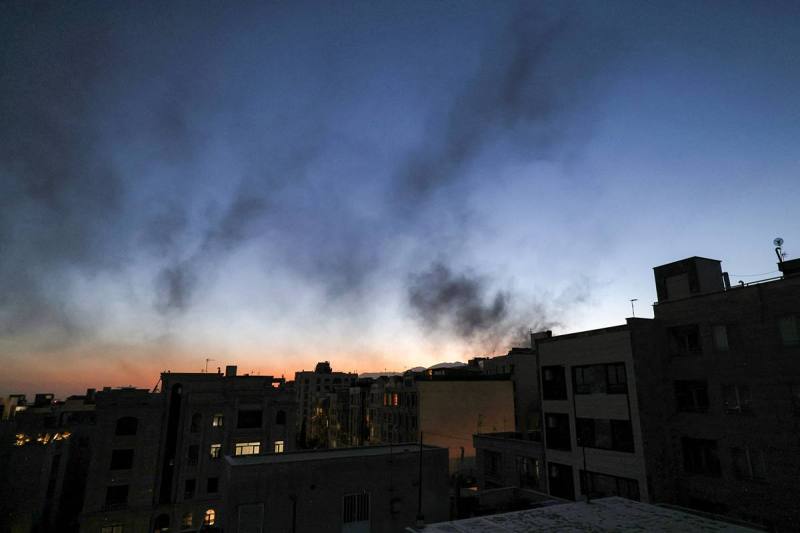China Backs Iran in Fight Against Israel

China Backs Iran in Fight Against Israel
Beijing’s response is stronger and more direct than before.
China’s permanent representative to the United Nations, Fu Cong, addresses delegates during a meeting of the United Nations Security Council in New York on June 17. Eduardo Munoz/Reuters
Welcome to Foreign Policy’s China Brief.
The highlights this week: China picks sides in the Iran-Israel conflict, Chinese President Xi Jinping travels to Kazakhstan, and China flexes its rare-earths leverage over the United States.
Welcome to Foreign Policy’s China Brief.
The highlights this week: China picks sides in the Iran-Israel conflict, Chinese President Xi Jinping travels to Kazakhstan, and China flexes its rare-earths leverage over the United States.
China Supports Iran, Condemns Israel
China has taken a stance on the ongoing Iran-Israel conflict. On Saturday, Foreign Minister Wang Yi told his Israeli counterpart in a phone call that Israel’s strikes against Iran were “unacceptable” and a “violation of international law.”
Wang offered support to his Iranian counterpart in “safeguarding [Iran’s] national sovereignty, defending its legitimate rights and interests, and ensuring the safety of its people.” Chinese President Xi Jinping echoed these comments in a statement Tuesday. The Chinese response is stronger and more direct than its reaction to the round of conflict between Iran and Israel last fall.
China has mustered its diplomatic resources, including issuing a condemnation of Israel’s latest strikes through the Shanghai Cooperation Organization (SCO), of which Iran is a member. This prompted a rebuke from India, an SCO member with strong arms-trading ties to Israel that was not consulted on the statement.
Iran has drawn closer to China in recent years, with the two countries cooperating regularly on military exercises and signing an economic, military, and security cooperation agreement in 2021. More than 90 percent of Iranian oil exports go to China—using a system of workarounds to bypass Western banks and shipping services and yuan-denominated transactions to avoid triggering sanctions.
If Israel is successful in disrupting Iran’s oil industry, it could be painful for China. But since Iran is only China’s sixth-biggest supplier, China will be able to absorb the blow.
China is unlikely to provide Iran with anything more than rhetorical support, despite its strong statement. It has little desire to get drawn further into Middle Eastern affairs, instead welcoming the distraction for the United States. Hawks in Washington have tried to sell the China-Iran connection as stronger than it is; Iran is ultimately marginal to China’s core interests.
If China were to intervene, it would probably be to pressure Iran not to close the Strait of Hormuz to shipping, as Tehran has threatened in the past. Although China’s main oil supplier is Russia, about half of all Chinese oil imports come from Gulf states. A disruption of the strait and subsequent surge in energy prices would be painful for China’s already struggling economy.
China may have hopes of acting as a peacemaker, building on its mediation of Iran-Saudi reconciliation in 2023. But it’s hard to see Israel accepting China as a neutral broker. Sino-Israeli relations have degenerated amid the Israel-Hamas war, both due to China’s pro-Palestinian position and outbreaks of antisemitism on the Chinese internet. Turning to China for a deal would also risk alienating a petulant U.S. president.
For China, an upside of the Iran-Israel conflict could be new markets for its defense technology. Pakistan outperformed expectations in its recent skirmish with India, a success attributed in large part to its use of Chinese systems: the J-10C fighter jet, which was battle-tested for the first time in that conflict, and the mostly Chinese-made air defense system.
So far, Israel has dominated over Iran’s outdated air defense systems and air force, and remedying that is going to be high on Tehran’s agenda once it has some breathing room. Middle Eastern buyers were previously skeptical of J-10s, but Iran seemed interested before the current conflict.
China was once a major arms partner of Iran, but the two countries have not signed any new deals since 2005. That could now change.
What We’re Following
Xi woos Central Asia. Xi is visiting Kazakhstan to meet with Central Asian leaders, looking to expand China’s trade in an energy-rich region. Since taking office, Xi has visited Kazakhstan more times than any other country, except for Russia. In that time, China has supplanted Russia as Kazakhstan’s primary trading partner.
But the Kazakh public is less keen on its neighbor, with many people expressing the view that their country’s elites are selling them out to Beijing. China’s internment of ethnic Kazakhs in Xinjiang has been a source of uproar in Kazakhstan, but the Kazakh government has nevertheless cracked down on Xinjiang rights activists to appease Beijing.
Romance genre crackdown. Chinese police are once again arresting the authors of so-called boys’ love fiction, a popular online romance genre featuring homoerotic relationships between male characters. It originated in Japan and is largely written by and for women. Under Xi, online censors have repeatedly targeted the genre.
The animus is driven by a combination of factors: homophobia, anti-Japanese sentiment, and an increasingly patriarchal attitude toward women’s sexuality. This latest round also seems to be a manifestation of “deep-sea fishing,” in which police look for offenses committed outside of their jurisdiction in order to impose fines and line their own pockets.
At least 100 writers nationwide are estimated to have received police summons, often issued by authorities in other provinces, and face the prospect of fines or jail time.
FP’s Most Read This Week
- How the Israel-Iran War Might End by Iselin Brady and Daniel Byman
- Israel Is Going for the Death Blow on Iran by Steven A. Cook
- Nuclear Claims Are a Smoke Screen for Hopes of Toppling Iran by Jeffrey Lewis
Tech and Business
Rare earths leverage. After negotiators met in London last week, China has agreed to resume shipping rare earths to the United States. However, China is still limiting some rare-earth exports—specifically, those used by the U.S. military.
As Scott Kennedy writes in Foreign Policy, China has clearly demonstrated its leverage in this area. Its near-total monopoly on rare-earth production gives it the ability to turn off critical sectors of U.S. manufacturing. Beijing has previously avoided fully using that power, largely out of worry that it would drive Washington to reshore rare-earth refinement.
This pause, however, showed that China was willing to turn the tap off. U.S. officials considered imposing new restrictions on critical technology exports before the London meeting, but China clearly won this game of chicken.
In recent days, U.S. President Donald Trump’s language has been increasingly conciliatory, walking back threats to revoke visas of Chinese students and expressing a desire to invite China—and its friend Russia—to join the G-7.
Hong Kong labor group closes. The China Labor Bulletin, a Hong Kong-based source for information on protests, wage disputes, and strikes in mainland China, has shut down after 31 years, citing financial problems. It’s possible that the destruction of U.S. foreign aid under Trump has affected the group.
But the sudden closure of the China Labor Bulletin and the disappearance of its website suggest that it may have been targeted by Hong Kong authorities. The introduction of a draconian national security law in 2020 effectively eliminated freedom of speech in Hong Kong, though some groups have managed to survive.
The China Labor Bulletin was founded by Tiananmen dissident and mainland exile Han Dongfang, who emerged from the often-forgotten but critically important workers’ side of the 1989 democracy movement. Labor organization is illegal in China outside of the toothless official trade union, and poor working conditions and wage theft are common.
Informal unions and activism play a strong role in defending migrants’ labor rights, but like the rest of civil society, they have been targeted under Xi.
This post is part of FP’s ongoing coverage. Read more here.
James Palmer is a deputy editor at Foreign Policy. Bluesky: @beijingpalmer.bsky.social
Stories Readers Liked
Iran-Israel Conflict
Analysis and reporting

How the Israel-Iran War Might End
Scenarios include an Iranian defeat, an Israeli retreat—or an expanded regional conflict.



















Join the Conversation
Commenting is a benefit of a Foreign Policy subscription.
Subscribe
Subscribe
Already a subscriber?
.
View Comments
Join the Conversation
Join the conversation on this and other recent Foreign Policy articles when you subscribe now.
Subscribe
Subscribe
Not your account?
View Comments
Join the Conversation
Please follow our comment guidelines, stay on topic, and be civil, courteous, and respectful of others’ beliefs.
View Comments
Change your username |
Log out
Change your username:
CANCEL
Confirm your username to get started.
The default username below has been generated using the first name and last initial on your FP subscriber account. Usernames may be updated at any time and must not contain inappropriate or offensive language.